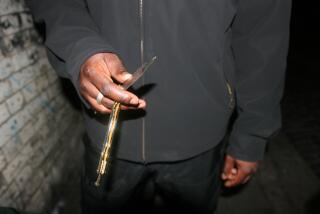Bid to Dismiss Whistle-Blower Case Against Litton Rejected
- Share via
A federal district court judge in Los Angeles on Monday rejected Litton Industries’ claim that a 1986 “whistle-blower” law is unconstitutional, paving the way for a massive civil fraud case against the defense contractor to go forward.
U.S. District Judge Mariana R. Pfaelzer denied Beverly Hills-based Litton’s motion to dismiss a case jointly filed by the Justice Department and a former official of the company on the grounds that the 1986 amendments to the False Claims Act, which encourage whistle-blowers to report fraud, are unconstitutional.
Earlier this year, Pfaelzer, in a lengthy written opinion, denied a similar challenge to the law lodged by the Northrop Corp. At the time, she rejected Northrop’s assertions that the statute violated the separation of powers clause of the Constitution and illegally enabled private parties to usurp prosecutorial powers, which should be reserved to government officials.
Four Rulings So Far
The judge’s ruling Thursday was not surprising, both because of her earlier ruling and because of the fact that the government is a party to the Litton case. Howard Daniels, an assistant U.S. attorney in Los Angeles, had filed a motion in this case asserting that a challenge to the constitutionality of the whistle-blower law had no validity because the government is participating in the suit.
Pfaelzer’s decision means that there have been four rulings this year by federal district judges in California denying claims by defense contractors that the whistle-blower law is invalid. Besides the two cases she ruled in, unsuccessful challenges also were lodged by McDonnell Douglas Corp. and Lockheed.
Upon a request by Carolyn Kuhl, one of Litton’s lawyers, Pfaelzer said she would “certify” her decision so that the company could file an appeal with the U.S. 9th Circuit Court of Appeals. A review by an appeals court at this stage of a case is discretionary. Already this year, a panel of 9th Circuit judges declined to review a ruling which upheld the whistle-blower law’s constitutionality in the case involving McDonnell Douglas. That case has since been settled out of court.
The case against Litton was filed in April, 1988, by Hall & Phillips, a West Los Angeles law firm, on behalf of James Carton, the former technical director of Litton Computer Systems. In late March, the Justice Department announced that it had joined the case after making an independent review of the facts.
The suit asserts that Litton’s computerized cost accounting system systematically misallocated costs between the company’s commercial and government contracts, resulting in overcharges on government contracts. Carton said in the suit that he had discovered the scheme to shift excessive costs to military contracts in 1986 in a study of the profitability of Litton’s commercial contracts. He said he related his findings to his superiors and they ignored them.
Litton has denied any wrongdoing.
John Phillips, one of Carton’s lawyers, said the excess charges to the Pentagon topped $25 million and that since law provided treble damages and other penalties, Litton’s potential liability exceeds $100 million. “We intend to proceed with extensive discovery in the case,” Phillips said Monday. Daniels declined comment, as did Litton’s lawyers.
Under the False Claims Act, individual plaintiffs can recover from 15% to 25% of the damages in a fraud case when the government has joined the suit.
More to Read
Inside the business of entertainment
The Wide Shot brings you news, analysis and insights on everything from streaming wars to production — and what it all means for the future.
You may occasionally receive promotional content from the Los Angeles Times.










